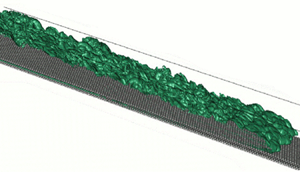Article contents
Gravity currents over fixed beds of monodisperse spheres
Published online by Cambridge University Press: 02 September 2020
Abstract

Laboratory experiments and direct numerical simulations are employed to investigate lock-exchange gravity currents propagating over close-packed, fixed porous beds of monodisperse spherical particles, and to quantify the mass and momentum transfer between the currents and the bed. The simulations show that the mass exchange of the current with the bed involves two separate steps that operate on different time scales. In a first step, the dense current front rapidly sweeps away the resident fluid in the exposed pore spaces between the top layer of spheres, while in a second step, a buoyancy-driven vertical exchange flow between the current and the deeper pores is set up that takes significantly longer to develop. This process depends on the permeability of the bed, which in turn is a function of the particle diameter. The momentum exchange between the current and the bed strongly depends on the ratio of the particle size to the viscous sublayer of the current. The bottom friction is moderate when the particle size is smaller than or comparable to the thickness of the viscous sublayer, but it jumps for particles that strongly protrude from the sublayer, leading to a more rapid deceleration of the flow.
Information
- Type
- JFM Papers
- Information
- Copyright
- © The Author(s), 2020. Published by Cambridge University Press
References
REFERENCES
- 11
- Cited by


